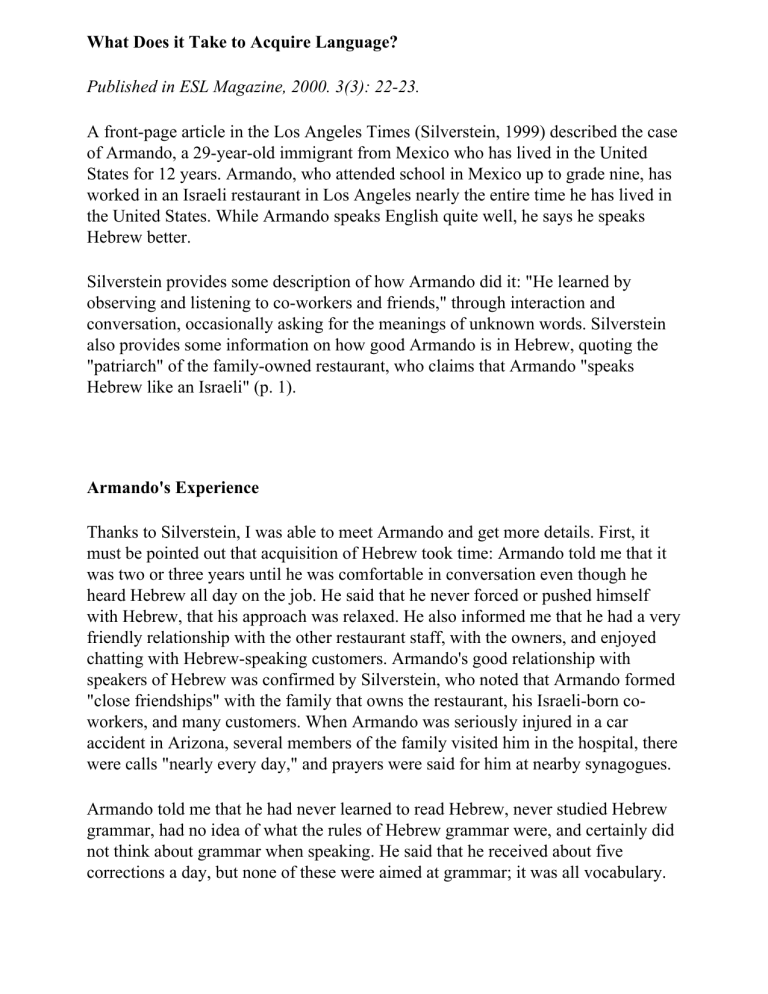
What Does it Take to Acquire Language? Published in ESL Magazine, 2000. 3(3): 22-23. A front-page article in the Los Angeles Times (Silverstein, 1999) described the case of Armando, a 29-year-old immigrant from Mexico who has lived in the United States for 12 years. Armando, who attended school in Mexico up to grade nine, has worked in an Israeli restaurant in Los Angeles nearly the entire time he has lived in the United States. While Armando speaks English quite well, he says he speaks Hebrew better. Silverstein provides some description of how Armando did it: "He learned by observing and listening to co-workers and friends," through interaction and conversation, occasionally asking for the meanings of unknown words. Silverstein also provides some information on how good Armando is in Hebrew, quoting the "patriarch" of the family-owned restaurant, who claims that Armando "speaks Hebrew like an Israeli" (p. 1). Armando's Experience Thanks to Silverstein, I was able to meet Armando and get more details. First, it must be pointed out that acquisition of Hebrew took time: Armando told me that it was two or three years until he was comfortable in conversation even though he heard Hebrew all day on the job. He said that he never forced or pushed himself with Hebrew, that his approach was relaxed. He also informed me that he had a very friendly relationship with the other restaurant staff, with the owners, and enjoyed chatting with Hebrew-speaking customers. Armando's good relationship with speakers of Hebrew was confirmed by Silverstein, who noted that Armando formed "close friendships" with the family that owns the restaurant, his Israeli-born coworkers, and many customers. When Armando was seriously injured in a car accident in Arizona, several members of the family visited him in the hospital, there were calls "nearly every day," and prayers were said for him at nearby synagogues. Armando told me that he had never learned to read Hebrew, never studied Hebrew grammar, had no idea of what the rules of Hebrew grammar were, and certainly did not think about grammar when speaking. He said that he received about five corrections a day, but none of these were aimed at grammar; it was all vocabulary. An Informal Evaluation I conducted an informal evaluation of Armando's Hebrew competence. I tape recorded a brief conversation, somewhat contrived, but the best that could be done under the circumstances. (It would be have much better to obtain some completely unmonitored speech, recorded when Armando was not aware it was being recorded; this, of course, would hardly be ethical.) At my request, Armando chatted with a native speaker, an Israeli friend of his, about what he did the day before (it was the Sabbath). The conversation lasted about five minutes. The recording was played the next day for four adult native speakers of Hebrew: two employees of the Israeli consulate and two employees of the Israeli tourist office in Los Angeles. I did not indicate who the speaker was but only asked them to listen and evaluate Armando's Hebrew. The judges listened to about two minutes of Armando talking about his activities on Saturday. The listening was done in a corridor in an office building (because of tight security in the consulate), and the recording was not of high quality. The judges were not told anything about Armando until after they made their judgment. Here are the results: Judge 1 felt that the speaker was a native speaker of Hebrew, had no accent, and made no grammatical errors. Armando's language, however, was judged to be "unsophisticated." Judge 2 felt that Armando was a long time resident of Israel and could have been born there. He thought that Armando might speak Hebrew as a second language and speaks another language at home. Armando's Hebrew was "not quite standard" but was acceptable. This judge guessed that Armando was Moroccan, which is quite interesting, because the owners of the restaurant are from Morocco. Judge 3 decided that Armando was not a native speaker of Hebrew, but felt that he was very good: "He can clearly say anything he wants to say," but shows "some hesitancy." This judge guessed that Armando had lived in Israel "perhaps one or two years" and has had lots of interaction with Israelis. Judge 4 thought that Armando was Ethiopian. She felt that he was not a native speaker of Hebrew but is clearly very good, clearly fluent. He is, she felt, obviously "comfortable" in Hebrew and speaks like someone who has lived in Israel for a few years. He uses slang but uses it appropriately. The range is thus from "very good but nonnative" to native. This is very impressive. Discussion The measure used to evaluate Armando's Hebrew was quite crude, but ecologically fairly valid. Native speakers of Hebrew regard him as a fluent, comfortable speaker of Hebrew, and two of the four judges thought he spoke Hebrew like someone born in Israel. The case is quite consistent with current theory (e.g., Krashen, 1985; 1999), and shows that "acquisition" alone can lead to impressive levels of competence in a second language. Armando had the necessary ingredients: comprehensible input (although it was not comprehensible at first) and a low "affective filter." The most striking aspect of this case, in my opinion, is the support it provides for the notion of club membership, the idea that we "talk like the people we perceive ourselves to be." (Smith, 1988, p. 4; see also Beebe, 1985). Armando, it can be hypothesized, made the extraordinary progress he did because he had comprehensible input and because he joined the club of speakers who used the language. (Note that the "club" in this case was a circle of friends, not a national or ethnic group; Armando has not converted to Judaism.) Of course, Hebrew was not comprehensible for him right away. His great accomplishment was due to patience, being willing to acquire slowly and gradually with a long silent period (or period of reduced output). With a "natural approach" language class Armando would have had comprehensible input right away and would moved through the beginning stages more quickly, and real conversational Hebrew would have been comprehensible earlier. I predict that a traditional class focusing on grammar would not have had this effect. Armando's case also shows us that one can do quite well in second language acquisition without living in the country in which the language is spoken and without formal instruction. The crucial variables appear to be comprehensible input and having a good relationship with speakers of the language. References Beebe, L. 1985. Input: choosing the right stuff. In Grass, S. and Madden, C. (Ens.) Input in Second Language Acquisition. Rowley, MA: Newbury House. pp. 404- 414. Krashen, S. 1985. The Input Hypothesis. Beverly Hills: Laredo Publishing Company. Krashen, S. 1999. Language Teaching: The Easy Way. Culver City, CA: Language Education Associates. Silverstein, S. 1999. Crossing language barriers. Los Angeles Times, December 8, 1999, A1,34,35. Smith, F. 1988. Joining the Literacy Club. Portsmouth: Heinemann.


